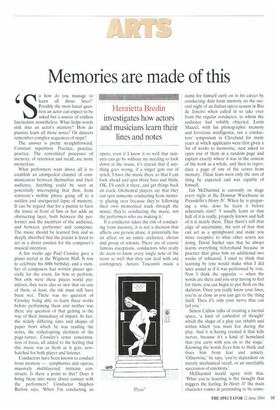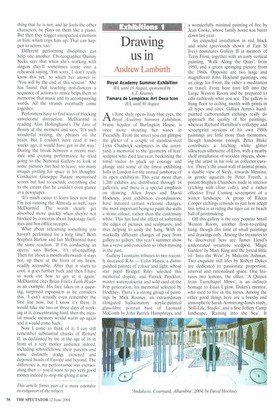Memories are made of this
Henrietta Bredin investigates how actors and musicians learn their lines and notes
So how do you manage to learn all those lines?' Possibly the most banal question an actor can expect to be asked but a source of endless fascination nonetheless. What helps words sink into an actor's memory? How do pianists learn all those notes? Or dancers remember complex sequences of steps?
The answer is pretty straightforward. Constant repetition. Practice, practice, practice. The convoluted processes of memory, of retention and recall, are more mysterious.
What performers want above all is to establish an unimpeded channel of communication between themselves and their audience. Anything could be seen as potentially interrupting that flow, from someone's mobile phone going off to a sudden and unexpected lapse of memory. It can be argued that for a pianist to have the music in front of him or her adds an obstructing layer, both between the performer and the members of the audience, and between performer and composer. The music should be learned first and so deeply absorbed that the pianist is freed to act as a direct conduit for the composer's musical intention.
A few weeks ago Paul Crossley gave a piano recital at the Wigmore Hall. It was to celebrate his 60th birthday, and a number of composers had written pieces specially for the event, for him to perform. Not only were these pieces world premieres; they were also so new that on one of them, at least, the ink must still have been wet. There was no question of Crossley being able to learn these works before performing them and neither was there any question of that getting in the way of their immediacy of impact. In fact, the widely differing sizes and shapes of paper from which he was reading the notes, the coiled-spring alertness of the page-turner, Crossley's tense concentration of focus, all added to the feeling that this music was as fresh as it gets, newhatched for both player and listener.
Conductors have been known to conduct from memory — symphonies and operas, massively multilayered, intricate constructs. Is there a point to this? Does it bring them into more direct contact with the performers? Conductor Stephen Barlow says, When I'm conducting an opera, even if I know it so well that minutes can go by without my needing to look down at the music, it's crucial that if anything goes wrong, if a singer gets out of synch, I have the music there so that I can look ahead and spot three bars and think, OK, I'll catch it there, and get things back on track. Orchestral players say that they can spot someone conducting from memory glazing over because they're following their own memorised track through the music; they're conducting the music, not the performers who are making it.'
If a conductor takes the risk of conducting from memory, it is not a decision that affects one person alone, it potentially has an affect on an entire orchestra, chorus and group of soloists. There are of course famous exceptions, conductors who really do seem to know every single note of the score so well that they can deal with any contingency. Arturo Toscanini made a name for himself early on in his career by conducting Aida from memory on the second night of an Italian opera season in Rio de Janeiro when called in to take over from the regular conductor, to whom the audience had volubly objected. Lorin Maazel, with his photographic memory and ferocious intelligence, ran a conductors' symposium in Cleveland for many years at which applicants were first given a list of works to memorise, next asked to open one of them at a random page and explain exactly where it was in the context of the work as a whole, and then to reproduce a page of one of the scores from memory. These feats were only the sort of thing he expected and was capable of himself.
Ian McDiarmid is currently on stage every night at the Donmar Warehouse in Pirandello's Henry IV. When he is preparing a role, does he learn it before rehearsals start? 'I usually learn so that half of it is really, properly known and half of it is nearly there. Then there's still that edge of uncertainty, the sort of fear that can act as a springboard and make you more receptive to what other actors are doing. David Suchet says that he always learns everything beforehand because in practice that gives him an additional two weeks of rehearsal. I used to think that learning by rote would make what I did later sound as if it was performed by rote. Now I think the opposite — when the words are there and you stop having to feel for them, you can begin to put flesh on the skeleton, Once you really know your lines, you're as close as you can get to the thing itself. Then it's only your nerve that can fail you.'
Simon Callow talks of creating a mental space, 'a kind of cathedral of thought' which the shape of a play can inhabit and within which 'you must live during the play. And it is having created it that kills nerves, because it's a kind of homeland that you carry with you on to the stage.' Knowing the words frees him to think and frees him from fear and anxiety. 'Otherwise,' he says, 'you're dependent on merely mechanical recall, or an unreliable succession of emotions.'
McDiarmid would agree with that. 'What you're learning is the thought that triggers the feeling. In Henry IV the main character comes in pretending to be some thing that he is not, and he fools the other characters, he plays on them like a piano. But then they trigger unexpected emotions in him, which trips him up. That can happen to actors, too.'
Different performing disciplines can help one another. Choreographer Quinny Sacks says that when she's working with singers they'll sometimes come into a rehearsal saying, 'I'm sorry, I don't really know this yet,' to which her answer is: 'You will by the end of this session.' She has found that teaching non-dancers a sequence of actions to music helps them to memorise that music and its accompanying words. All the strands eventually come together.
Performers have to find ways of blocking unwelcome distraction. McDiarmid is reading Alan Hollinghurst's The Line of Beauty at the moment and says, 'It's such wonderful writing, the phrases oil the brain. But I couldn't have read it two weeks ago; it would have got in the way.' During the break between a recent matinee and evening performance he tried going to the National Gallery to look at some pictures but had to leave; too many images jostling for space in his thoughts. Conductor Giuseppe Patane memorised scores but had to exclude everything else to the extent that he couldn't even glance at a newspaper.
'It's much easier to learn lines now that I'm not running the Almeida as well,' says McDiarmid. The words clearly get absorbed more quickly when they're not blocked by concerns about backstage facilities and box-office receipts.
What about relearning something you haven't performed for a long time? Both Stephen Barlow and Ian McDiarmid have the same reaction. 'If I'm conducting an opera,' says Barlow, 'it's all-engulfing. Then for about a month afterwards it stays hot, up there at the front of my brain, readily accessible. After that it starts to cool, it goes further back and then I have to work out how to get at it again.' McDiarmid cites Brian Friel's Faith Healer as an example. His face takes on a questing, surprised expression as he considers this. 'I can't actually even remember the first line now, but I know it's there. It would take me two or three days of working at it, concentrating hard, then the mental muscle memory would warm up again and it would come back.'
Now I come to think of it, I can still remember substantial chunks of Richard II, as declaimed by me at the age of 16 in front of a very motley audience indeed, including schoolfellows, their parents and some distinctly dodgy crowned and deposed heads of Europe and beyond. The difference is, my performance was excruciating then — you'd want to pay very good money indeed to stop me giving it now.
This article forms part of a more extensive investigation of the subject.



















































































 Previous page
Previous page